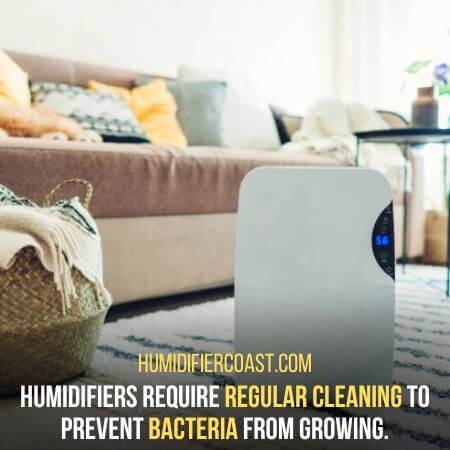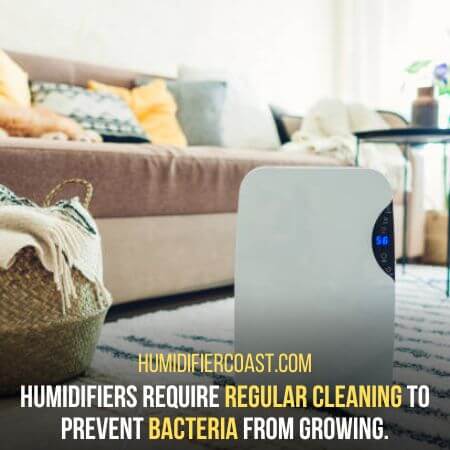Should you use a humidifier every day? Well, that depends on a few factors. Like climate, the desired level of humidity, and health conditions.
A humidifier is a great way to add moisture to the air, especially during the winter when the air is dry.
Should You Use A Humidifier Every Day? Consider These 8 Factors
But excess of everything is bad, and that includes humidity. Too much moisture in the air can lead to health problems.
It can also create an environment for mold and mildew to grow. So, the question is, how do you know if you should be using a humidifier every day?
Let’s take a look at some factors that will help you make the decision.
1. Climate:
If you live in an area with a climate that is naturally humid, you don’t need to use a humidifier every day.
But if you live in a dry climate, using a humidifier every day can help prevent some health problems.

For instance, people who live in dry climates are more likely to experience nosebleeds, dry skin, and static electricity.
Climate changes with the seasons. So you may need to use a humidifier more during the winter and less during the summer.
Also, if you live in an area that has a lot of pollution, you may need to use a humidifier more often.
Or if the climate is very hot, you may need to use a humidifier every day. Humidifiers relieve the heat a bit by making the air feel cooler.
2. Desired Level of Humidity:
The ideal level of humidity is between 30 and 50%. If the level of humidity in your home is below 30%, it’s too dry.
And if it’s above 50%, it’s too humid. You can buy a hygrometer to measure the level of humidity in your home.
If you want to maintain a certain level of humidity, you’ll need to use a humidifier.
For example, if you have asthma, you may need to keep the humidity at 50% to prevent asthma attacks.
Or if you have allergies, you may need to keep the humidity at 30% to prevent dust mites from thriving.
Likewise, if you live in a dry climate, you may need to use a humidifier every day to reach the desired level of humidity.
3. Health Conditions:
Some health conditions can be improved by using a humidifier.
For instance, if you have a cold, moist air can help relieve congestion. If you have the flu, a humidifier can also help relieve congestion and make it easier to breathe.
Humidifiers can also help with dry skin, eczema, and psoriasis.
And if you have asthma or allergies, using a humidifier can help prevent attacks.
If you have any of these health conditions, you may need to use a humidifier every day.
More such health issues that can be tackled by using a humidifier every day are a sore throat, coughing, and difficulty sleeping.
If you’re not sure whether you should be using a humidifier every day, it’s best to consult with your doctor.
They can help you make decisions based on your individual health needs.
4. Type of Humidifier:
There are several types of humidifiers. And each type has its advantages and disadvantages.
The most common type of humidifier is the ultrasonic humidifier. It’s quiet and doesn’t require a filter.
It is, however, more likely to disperse bacteria into the air. So, if you have a health condition that can be worsened by bacteria, you may want to avoid this type of humidifier.
Another type of humidifier is the evaporative humidifier. It uses a filter to trap bacteria and doesn’t disperse bacteria into the air.
But it is louder than ultrasonic humidifiers and uses more electricity.
The third type of humidifier is the central humidifier. It’s installed in your HVAC system and can humidify your entire home.
But it’s the most expensive type of humidifier and requires professional installation.
Now that you know more about humidifiers, you can decide if you should be using one every day.
5. Cost Of Running A Humidifier:
If you decide to use a humidifier every day, it’s important to consider the cost of running it.
They can range in price from $30 to $300. And the cost of running a humidifier every day can add up.
So, if you’re on a budget, it’s important to consider the cost before making your decision.
For instance, an ultrasonic humidifier costs about $0.03 per hour to run.
An evaporative humidifier costs about $0.06 per hour to run. And a central humidifier costs about $0.15 per hour to run.
6. Maintenance Of Humidifier:
It’s also important to consider the maintenance of humidifiers. They all require regular cleaning to prevent bacteria from growing.

And if you have a central humidifier, you’ll need to have it serviced by a professional every year.
Changing filters and cleaning the unit can also add to the cost of running a humidifier.
So, if you’re on a budget, it’s important to keep the maintenance costs in mind when making your decision.
7. Size Of The Humidifier:
The size of the humidifier is also an important consideration. If you have a large home, you’ll need a larger humidifier.
And if you have a small home, you’ll need a smaller humidifier. You can run into problems if you buy a humidifier that’s too small or too large for your home.
If you buy a humidifier that’s too small, it won’t be able to humidify your entire home.
And thus even if you run it all day, you may not be able to reach the desired level of humidity.
On the other hand, if you buy a humidifier that’s too large, it will use more electricity and cost more to run.
It’s important to find the right size humidifier for your home to get the best results.
8. Different Settings Of Humidifiers:
Most humidifiers have different settings that you can choose from. The most common settings are low, medium, and high.
Each set will produce different results. And it’s important to experiment with the different settings to find the one that works best for you.
Some humidifiers also have a timer that you can set. This is a great feature if you want the humidifier to turn off automatically after a certain period.
So rather than having to remember to turn it off, you can set it and forget it.
Now you can run it for the desired length of time, and it will turn off automatically.
So here are some things to consider if you’re wondering if you should be using a humidifier every day.
Just remember that excess of everything is bad. So, use a humidifier only when it’s necessary and keep the above factors in mind to make the best decision for you.
Cons Of Using A Humidifier Every Day:
While a humidifier has a lot of advantages, it also has some disadvantages.
Let’s discuss the main cons of using a humidifier every day.
1. They Can Be Loud:
The first con is that they can be loud. If you’re using an ultrasonic humidifier, it’s important to know that it can be very loud.
If you have a baby or a small child in the house, this can be a problem. They can also be disruptive if you’re trying to sleep.

So, if you’re looking for a humidifier that you can use at night, an ultrasonic humidifier may not be the best option.
Or, you may want to look for a humidifier with a timer so that it will turn off automatically after a certain period.
2. They Can Be Messy:
Another con of using a humidifier is that it can be messy. If you’re not careful, the water can spill out of the humidifier and onto your floor.
This can be a problem if you have hardwood floors or carpets. And if you have a baby or small child in the house, you’ll need to be extra careful to prevent them from spilling the water.
Likewise, if you have pets, you’ll need to be careful to keep them away from the humidifier.
3. They Are Costly To Run:
Another downside of using a humidifier is that they are costly to run. If you’re using an electric humidifier, it’s important to know that it can add to your electric bill.
And if you have a central humidifier, you’ll need to have it serviced regularly. This can add to the cost of running a humidifier.
So if you need one, be sure to factor in the cost of running it when making your decision.
4. They Can Be A Breeding Ground For Bacteria:
If you’re not careful, humidifiers can be a breeding ground for bacteria. This is because the water in the humidifier can become stagnant.
And it can start to grow bacteria. Or even mild and mildew problems that can occur if you’re not using the humidifier properly.
To avoid this, be sure to clean your humidifier regularly. And if you’re using a central humidifier, be sure to have it serviced regularly.

Change the water every day and change the filter every month or two.
By following these tips, you can prevent bacteria from growing in your humidifier.
5. They Can Over-Humidify Your Home:
Last but not least, one of the main disadvantages of using a humidifier is that it can over-humidify your home.
If you’re not careful, you can end up with too much moisture in the air. This can be a problem because it can lead to mold and mildew.
It can also be a problem for people with allergies or asthma. So, if you have any of these conditions, be sure to use a humidifier with caution.
Only use it when necessary and be sure to monitor the humidity levels in your home.
Conclusion:
You should use a humidifier only when it’s necessary and the air in your home is too dry.
Be sure to factor in the cost of running it and the potential for over-humidifying your home.
Use caution if you have allergies or asthma. And be sure to clean your humidifier regularly to prevent the growth of bacteria.
By following these simple tips, you
- How to Clean a Warm Mist Humidifier in 7 Easy Steps - October 9, 2023
- Warm Mist Humidifier: 5 Uses and 7 Life-Changing Benefits - October 9, 2023
- How to Clean a Cool Mist Humidifier? 4 Easy Steps - September 22, 2023
Leave a Reply